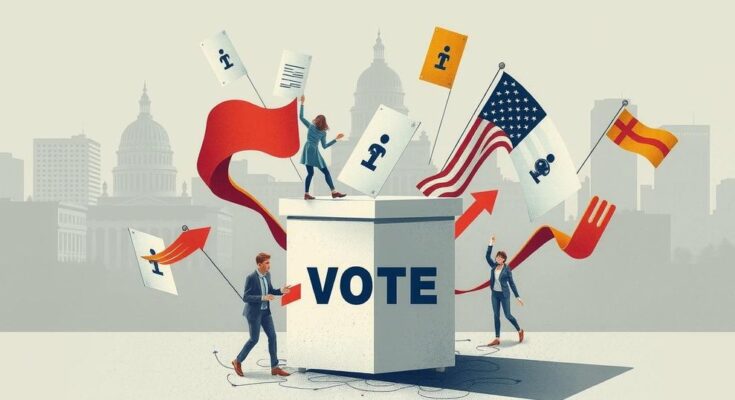Ecuador is poised for a significant presidential election between current President Daniel Noboa and leftist Luis González. Both candidates aim to address rising crime rates linked to drug trafficking. Voting is mandatory, and the election will determine the future stability of governance in Ecuador amidst ongoing challenges. A candidate must achieve a decisive majority to win, or a runoff will occur. Noboa has decreased homicide rates during his presidency, while González represents a controversial legacy.
Ecuador is preparing for its presidential election, with current President Daniel Noboa and leftist candidate Luis González emerging as the leading contenders among a total of 16 candidates. Both candidates are addressing the rampant crime that has significantly impacted daily life in the country over recent years, primarily linked to drug trafficking from neighboring Colombia and Peru. Voter sentiment regarding safety and crime is expected to play a crucial role in determining the election outcome.
The election is particularly significant as it may reflect a pattern similar to the 2023 elections, where voters opted for Noboa, a conservative millionaire, over González, who is influenced by former president Rafael Correa. Voting in Ecuador is compulsory, with over 13.7 million citizens eligible to cast their ballots. This election marks an important decision point as Ecuador faces ongoing challenges with violence and crime.
To secure a victory in the presidential election, a candidate must obtain at least 50% of the vote or at least 40% with a 10-point lead over their closest rival. Should no candidate achieve this majority, a runoff election is scheduled for April 13. The stakes are high for both Noboa, who has seen a decrease in the homicide rate under his leadership, and González, the protégé of a controversial former president, who carries the weight of Correa’s legacy.
Ecuador’s political landscape has been markedly influenced by rising violence, primarily fueled by drug trafficking. These events have created a heightened sense of insecurity among voters, rising from 8,237 homicides in 2023 to 6,964 in 2024. The presidential election is seen as a referendum on safety and governance. Daniel Noboa, a young millionaire from a prominent banana-exporting family, and Luis González, a figure associated with extensive late 2000s political reforms, are central to this electoral narrative.
The upcoming presidential election in Ecuador underscores the critical issues of crime and governance that are at the forefront of voters’ minds. With Daniel Noboa vying for reelection against leftist candidate Luis González, Ecuadorians face a significant decision regarding their leadership and the future direction of the country’s policies. The linkage between political authority and public safety will undoubtedly shape the election’s results.
Original Source: abcnews.go.com




